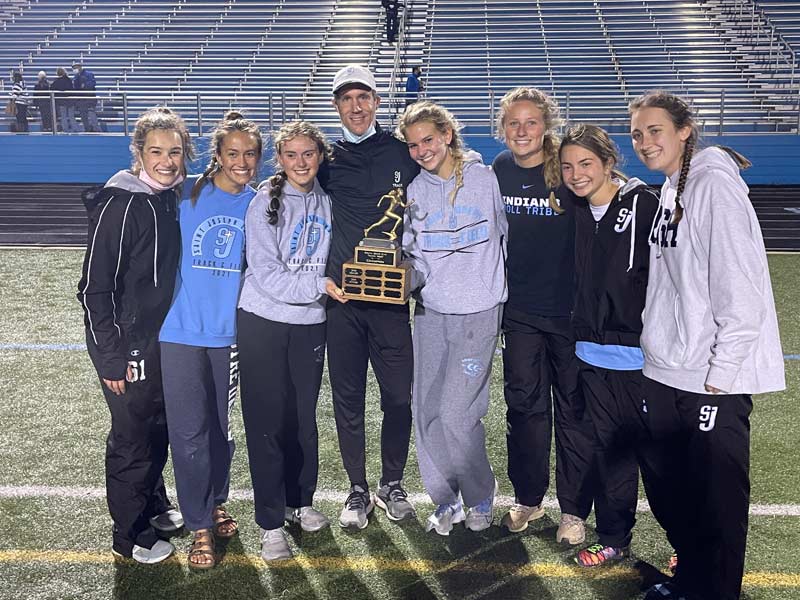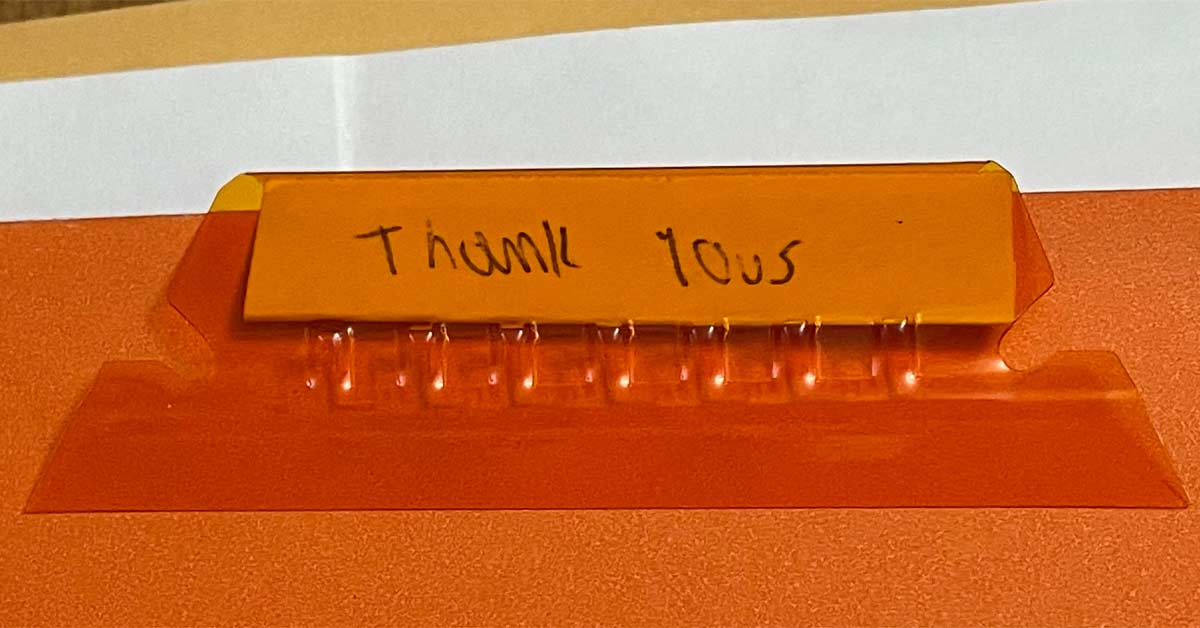At Elmhurst University’s recent Track and Football Consortium, Coach Rob Assise concluded his presentation by sharing a personal goal to write one thank-you note each week in the new year, saying that sharing his goal with the audience would help to hold him accountable. When held accountable, we can thrive individually; in holding others accountable, we teach someone else to thrive as well. Coaches who ask for accountability model behavior that, in fact, helps fellow coaches thrive.
In my home filing cabinet, where once-useful papers like product warranties and old tax returns rest in peace, my front file folder is labeled “Thank Yous.” Its contents include 64 (track coaches are precise with numbers) mostly handwritten thank-you notes from past students, student-athletes, and parents. On rare occasions when I access materials from the cabinet, there sits in the front folder a compelling reason to spontaneously read, knowing full well the writer’s words will evoke memories of the person and gratitude for their effort at the same time.
If you are a new coach, I encourage you to save any expressions of thanks. You will find that they energize you over and over just when they are most needed. Share on XIf you are a new coach, I encourage you to save any expressions of thanks. You will find that they energize you over and over just when they are most needed. In fact, I hope this letter becomes part of your own thank-you note collection. Therefore, in testament to committed coaches everywhere, especially those in the TFC community, I offer a thank-you note of my own to begin 2023.
Thank you to coaches who pay a high opportunity cost to coach. In other words, thank you to all committed coaches. Something impossible to understand by a non-coach is the fact that the job of a teacher/coach never stops.
On a recent “ESPN Daily” podcast, now two-time National Championship University of Georgia football coach Kirby Smart was described as being “never not in work mode.” Most coaches will work in relative anonymity compared to Coach Smart, but they’ll appreciate this description because it is their reality. It is impossible to turn off the coach’s brain. There is always practice footage to critique, a workout to write, an injury report to assess, or a meet entry to edit.
Committed coaches are perpetually at work. As I enter my 20th year of coaching high school track and field, I am thankful for and inspired by those who labor daily in details unknown and unappreciated by those outside the profession. Where practice for student-athletes may conclude at 6 p.m., committed coaches know powerful and candid one-on-one conversations aren’t cut short by the clock; these conversations are often best delivered at the end of a session when the day’s work is close to complete.
Tidying up the locker room, securing the facility, and conversing with the last athlete to be picked up always take coaches well past the 18th hour of the day. Knowing that peer coaches are doing their very best at the “routine but unseen” moves, motivates, and encourages me to do the same. For coaches who have ever doubted the effort is worth the abundant trade-offs, know that it is, and this effort is quietly understood by all in the coaching fraternity.
Thank you to committed coaches who work long hours and solve impossible problems. In the life of a committed coach, it is often a lonely walk to a dark, cold (maybe even Midwest cold!), and empty parking lot at the end of the day. Hours after colleagues have left for family, dinner, and hobbies, coaches everywhere finally make their way home under cover of darkness, faced with a constantly growing “to-do” list. The next day’s 6:00 a.m. practice, home meet setup, or spontaneous “challenges” that arrive in the hallways of every single school in the United States are the experiences that define our lives.

Committed coaches live the ups and downs with our student-athletes in a way that is, again, only understood by those who practice this profession. Know that you are not alone. Seek advice from others when faced with a dilemma. Offer to listen, as rarely is this skill given but always is this skill wanted.
Additionally, to those who read this article, the next time you are confronted with a coaching challenge, take a moment to reflect on your mentor coaches and seek clarity from the wisdom they surely imparted upon you that can assist in solving issues with your own student-athletes.
Finally, thank you to committed coaches who know how to elicit the best in others. Without competition, the previously mentioned preparation, sacrifice, and process would lack purpose. It is in striving for excellence, a virtue captured in the ancient Greek concept of arete, that committed coaches come back each day wanting to be a better version of themselves. Committed coaches continually improve through study, reflection, analysis, and attending world-class conferences like TFC. Through my two decades of coaching, I believe that excellence is knowing there is a right way to do everything and sacrificing all else to meet that expectation in every task, large or small.
The immediate product of our committed efforts is an enhanced ability to explain the sport to our student-athletes. The long-term product is an authentic demonstration of dedication. Through both long- and short-term lessons, we make better people, better teams, and better athletes. So long as we each push one another to strive for excellence, remain steadfast in our commitment to our student-athletes, and give thanks to one another for making this nonstop occupation possible, we can confidently say that we have fulfilled Coach John Wooden’s request to “Never cease trying to be the best you can be. That’s in your power.” Thanks to committed coaches for using this power in your vocation.
Since you’re here…
…we have a small favor to ask. More people are reading SimpliFaster than ever, and each week we bring you compelling content from coaches, sport scientists, and physiotherapists who are devoted to building better athletes. Please take a moment to share the articles on social media, engage the authors with questions and comments below, and link to articles when appropriate if you have a blog or participate on forums of related topics. — SF




